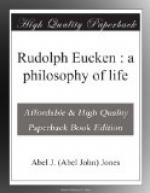In discussing the question of miracle, Eucken weighs the fact that a conviction of the possibility of miracle has been held by millions in various religions, and particularly in Christianity. He considers that the question of miracle is of more importance in the Christian religion than in any other, one miracle—the Resurrection—having been taken right into the heart of Christian doctrine. He finds, however, that the miracle is entirely inconsistent with an exact scientific conception of nature, and means “an overthrow of the total order of nature as this has been set forth through the fundamental work of modern investigation.” He does not consider such a position can be held without overwhelming evidence, and does not feel the traditional fact to have this degree of certainty, or to be inexplicable in another way. He considers that the explanation of the miracle probably lies in the psychic state of the witnesses.
Eucken shows in general extreme reluctance to make a historical event a foundation of belief, and this no doubt accounts to some extent for his attitude with regard to miracles. He points out that “the founders of religion have themselves protested against a craving after sensuous signs,” and that this protest “is no other than the sign of spiritual power and of a Divine message and greatness.” He considers that the belief in, and craving for, sensuous miracle is an outcome of a “mid-level of religion,” where belief is waning and spirituality declining. While, thus, he does not believe in sensuous miracle, he acknowledges and lays the greatest stress on one miracle—the presence of the Spiritual Life in man. It is, indeed, this miracle that renders others unnecessary.
In discussing the doctrine of the Incarnation, Eucken attempts to get at the inner meaning—the truth which the doctrine endeavours to express, and he finds this to consist in the fact of the ultimate union of the human and Divine, and this truth is one that we dare not renounce. He criticises the attempt that is made in Christianity to show that such union only obtained once in the course of history. Incarnation is not one historical event, but a spiritual process; not an article of belief, but a living experience of each spiritual personality.
He considers as injurious to religion in general the Christian conception of the Atonement. He believes that the idea that is to be expressed is that of the nearness of God to man in guilt and in suffering. In endeavouring to express this close intimacy the idea of suffering was transferred to God himself. The anthropomorphic idea of reconciliation and substitution thus arose, and this Eucken considers to have done harm. “The notion that God does not help us through His own will and power, but requires first of all His own feeling of pity to be roused, is an outrage on God and a darkening of the foundation of religion.” So Eucken objects to the attempt to formulate the mystery into dogma.




